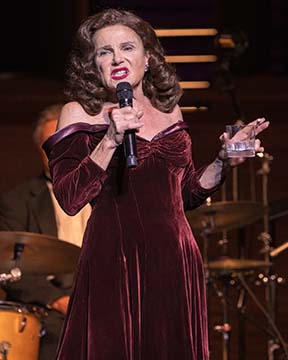Yip Harburg (1896-1981), was a socialist song writer born on the Lower East Side of New York, where he was named Isidore Hochberg. He changed that to the “American” Edgar Harburg, which would turn into “Yip” Harburg. Yip stood for Yipsel, the acronym of Young Peoples Socialist League, the youth group of the Socialist Party. How did he know that in some future years, that would label him “un-American”!
The best political song Harburg ever wrote was the depression anthem “Brother, Can You Spare a Dime?” part of the 1932 musical revue Americana with a melody based on a Russian-Jewish lullaby. At the 33rd New York Cabaret Convention October 26th — a major event in the cabaret landscape — it was given a brilliant staging and vocal performance by Marta Sanders. Striking in a black sequin jacket and colorful hair, she told the drama with sadness and passion, her voice sometimes only a whisper.
“They used to tell me I was building a dream, And so I followed the mob,/When there was earth to plow, Or guns to bear, I was always there, Right on the job./
“They used to tell me I was building a dream, with peace and glory ahead./Why should I be standing in line, just waiting for bread?
“Once I built a railroad, made it run/Made it race against time/Once I built a railroad, now it’s done/Brother can you spare a dime?
“Once in khaki suits/Gee, we looked swell/Full of that Yankee Doodle De Dum/Half a million boots went slogging through hell/I was the kid with the drum/
“Say don’t you remember, / They called me Al/It was Al all the time./ Say don’t you remember, I’m your pal!/Brother can you spare a dime?
Of course, it could be a theme of today.
Harburg also wrote the satire, sung by Tovah Feldshuh, successfully pretending to be Tallulah Bankhead and a little tipsy in a purple gown, imagining “When The Idle Poor Become The Idle Rich”.
“When the idle poor become the idle rich,/You’ll never know just who is who or who is which, /”Won’t it be rich when everyone’s poor relative becomes a Rockefellertive/And palms no longer itch, what a switch,
When we all have ermine and plastic teeth,/How will we determine who’s who underneath?/ “And when all your neighbors are upper class,/You won’t know your Joneses from your Astors,
When a rich man doesn’t want to work,/He’s a bon vivant, yes, he’s a bon vivant,/ “But when a poor man doesn’t want to work,/He’s a loafer, he’s a lounger, he’s a lazy good for nothing, he’s a jerk.
“When a rich man chases after dames,/He’s a man about town, oh, he’s a man about town,/ But when a poor man chases after dames,/He’s a bounder, he’s a rounder, he’s a rotter and a lotta dirty names.
You get the idea.
And that was the end of the iconic Yip Harburg lyrics. After the “The Wizard of Oz” (1939), Harburg would follow with such revolutionary texts as “Finnian’s Rainbow,” (1947) where a wish turns a southern racist politician black. But Harburg couldn’t Americanize his politics enough to avoid being caught in the neofascist Joe McCarthy trap set for anyone who challenged predatory capitalism, including taking a stand for civil rights and social justice, whose blacklisting kept Harburg from working during most of the 50s. Near the end of that dark decade, he found success with “Jamaica” (1957), the first Broadway musical about an interracial couple, acted by Lena Horne and Ricardo Montalbán.
Alas, there was no narrative to give the audience an idea of the importance of Harburg’s politics. Not even what “Yip” meant. Hope we aren’t back to the cowardly neo-fifties.
The announced hosts were Andrea Marcovicci & Jeff Harnar. Marcovicci (glittery) came on to say Harnar had tested positive for Covid that morning and was home. Practically nobody in the Rose Theatre audience had masks. Nor did I see anybody furtively put them on. So much for fantasy. Not Yip’s fantasy, their own believing the U.S. government tales about “just get a vaccine.” Which has zero effect on transmission. Pfizer CEO Bourla got it, Biden got it, Kamala and Nancy got it. Beltway Covid denialism wins.
Back to the event, which is glorious for cabaret lovers as it is every year since it began 33 years ago. It turns out Yip was also a romantic. And a lyricist for elegant songs.
- Ann Kittredge in a white gown uses her thrilling soprano for “How Are Things In Glocca Morra?”
- Danny Bacher is perky in “If I Only Had A Brain.”
- Marissa Mulder in a brassy voice almost copies the sound of a horn in “It’s Only A Paper Moon.”
- And Michael-Denby Cain sounds a smart jazzy baritone in “Down With Love.”
Karen Akers uses her storytelling voice to best advantage in “Paris Is A Lonely Town.” And Leanne Borghesi, in a side-split sequin gown, red heels and flower in hair, roars out “Satan’s Little Lamb.”
- Maude Maggart embellishes “Look To The Rainbow” with a bell clear full color soprano.
- Todd Murray, a rich baritone crooner, gives a jazzy showbiz tone to “Old Devil Moon.”
- Paula Dione Ingram makes you think her stomping ground Las Vegas with thrilling high notes in “Right As The Rain.”
- Elena Bennett, in a dusky voice that conjures up Marlene Dietrich, does the very anti-feminist “Thrill Me” as she submerges herself in an affair.
- Anna Bergman, reminding us that Harburg was a romantic, is beguiling in “What Is There To Say/Here’s To Your Illusions.”
- Josephine Sanges takes over the story in a jazzy, swinging, personable “Ding Dong, The Witch Is Dead.”
Andrea Marcovicci shows she still has an elegant soprano, moving up and down in octaves, with a song Harburg wrote for torch singer Helen Morgan, “What Wouldn’t I Do For That Man?” It is the best story of the cabaret.
Cabaret Convention, highlighting dozens of major cabaret singers in the U.S. and some abroad, is sponsored annually by Mabel Mercer Foundation, Rose Theater, Jazz at Lincoln Center, Broadway and 61st Street, NYC, info@mabelmercer.org, Oct 26, 2022.





